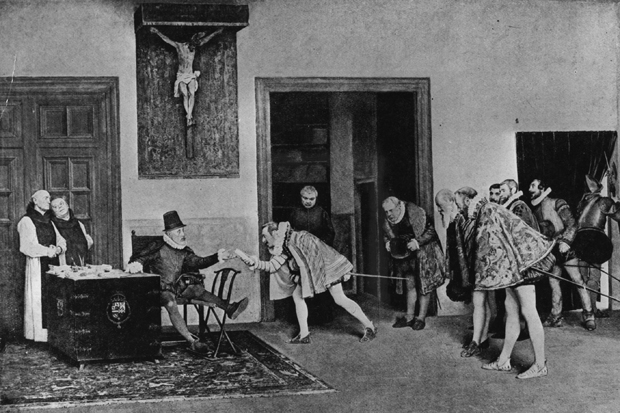‘Every schoolboy knows who imprisoned Montezuma and who strangled Atahualpa.’ Macaulay, anticipating Gove, was complaining that the schoolboys by contrast did not get enough about Clive and the British conquest of India. Hugh Thomas, in this and in the two previous volumes of his trilogy on the Spanish empire, presumes that we have all forgotten about Montezuma and Atahualpa, and argues that we do not appreciate Spain’s imperial achievements. He is probably right, and he sets one off to speculate why.
Take Philip II himself. He was musical, owning ‘ten clavicords, thirteen vihuelas, and sixteen bagpipes’. He had a library of 14,000 books, which we would consider more to his credit than his 6,000 holy relics, and an eye for Titian and Bosch. We are told, although no samples are given, that his jokes were amusing. His confessors were usually fat men, another supposedly endearing quality. He worked very hard, and occasionally confessed that he did not know what to do. Yet we do not warm to him, and all we remember about him is the Spanish Armada. His ideas of monarchia universalis are likely to excite as little enthusiasm with us as the European Union. His monastery-palace of the Escorial, despite its erudite defenders, we tend to find gloomy, a sort of giant corporate headquarters that would not be altogether out of place in, say, Detroit or St Louis, Missouri.
Then the empire. Leaving aside the ‘Black Legend’ of its cruelties, its Catholic and baroque societies and occasions are not ones we easily understand. What is more, the English were for its duration virtually excluded from it, and there are few accounts from Englishmen who knew it from the inside. The best, from the still too little-known Dominican Thomas Gage — The English American, His Travail by Sea and Land — is full of admiration for what he saw. Gage encouraged Cromwell’s Western Design, which led to our seizure of Jamaica, but that did not alter our status as second-rate onlookers in the Indies, a prey to prejudice, envy and greed.
How successful is Hugh Thomas in redressing the balance? He dearly loves a conquistador — he has published in Spain a biographical dictionary of them — and the earlier two volumes had the advantage of covering the epic era of the conquest, events as surprising and dramatic as any in human history. He is also partial to grandees, and here he has plenty of viceroys, archbishops, bishops and other eminences, briefly and confidently judged — easy-going, severe, intelligent, even occasionally obtuse.
He has chosen to cover this last period in 28 short chapters on episodes in, and aspects of, Philip’s vast dominions. He begins with the King, and then ranges from early Mexican insubordinations, Aguirre ‘Wrath of God’, Viceroy Toledo’s Peru, the Jesuits, the convents of Lima and Santa Rosa, the Chilean epic poem of ‘Ercilla’, to end with the Philippines and Spanish plans for the conquest of China — indeed, if Mexico had been a relative pushover, why not China? Send a couple of ships. These are reflective essays, with no pretence to original scholarship. A criticism would be that so much ground is covered that there is no space to look in satisfying detail at any of the societies that emerged in the immediate aftermath of conquest. Some readers will also feel that the author is more interested in conquerors than conquered, and that the treatment of the demographic collapse that followed in the Americas is too perfunctory. Quotations heading the chapters are sometimes gnomic: ‘Yucatan is not an island’ – Fray Diego de Landa; ‘There never was a Spanish Empire’ – Anthony Pagden; ‘Colonies are like fruits which cling to the tree only when they are ripe’ — Turgot. Discuss.
Yet Hugh Thomas’s concluding arguments are well made. The Spanish empire left much that we should admire, and much that deserves our attention: its cities and their monumental architecture, the chronicles of conquest and the subsequent descriptions of the cultures found, the moral seriousness of the contemporary debates, the scale and completeness of the whole endeavour. In all these respects, we Anglo-Saxons were for long Spain’s inferiors.






Comments